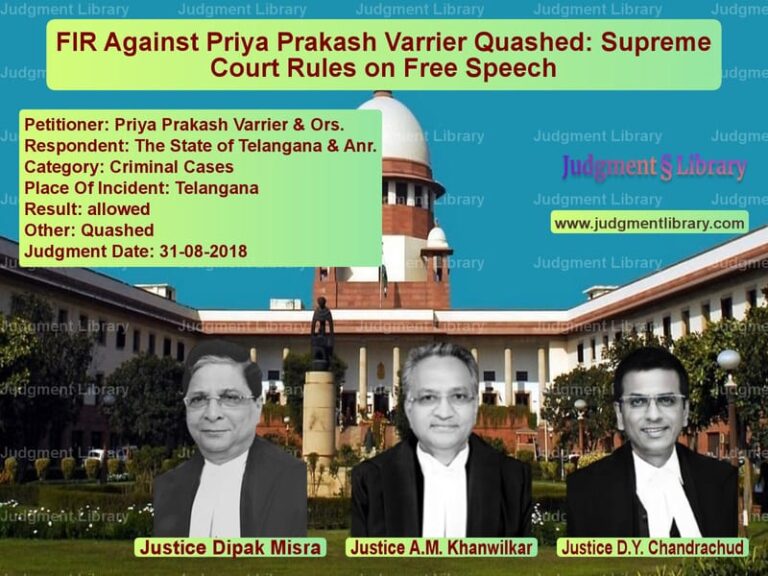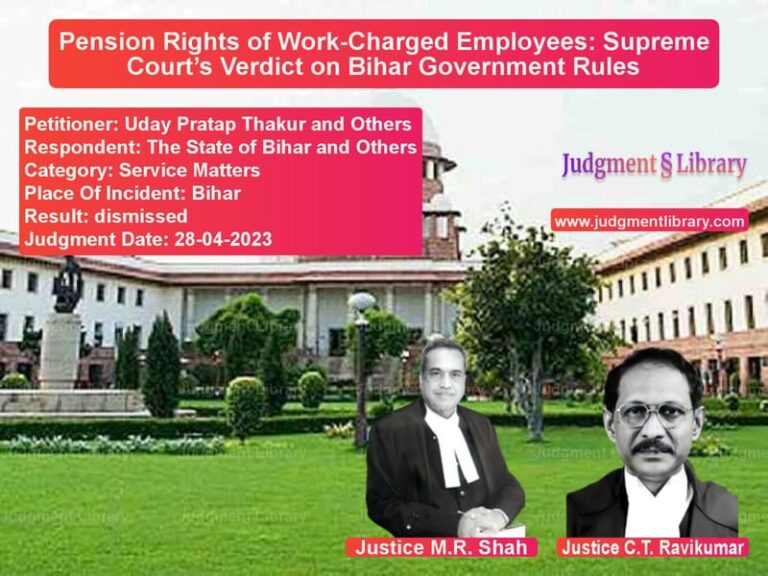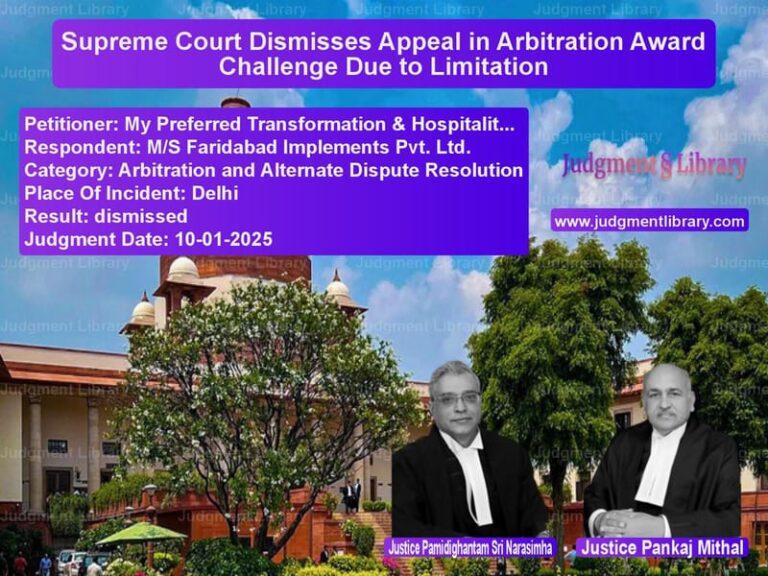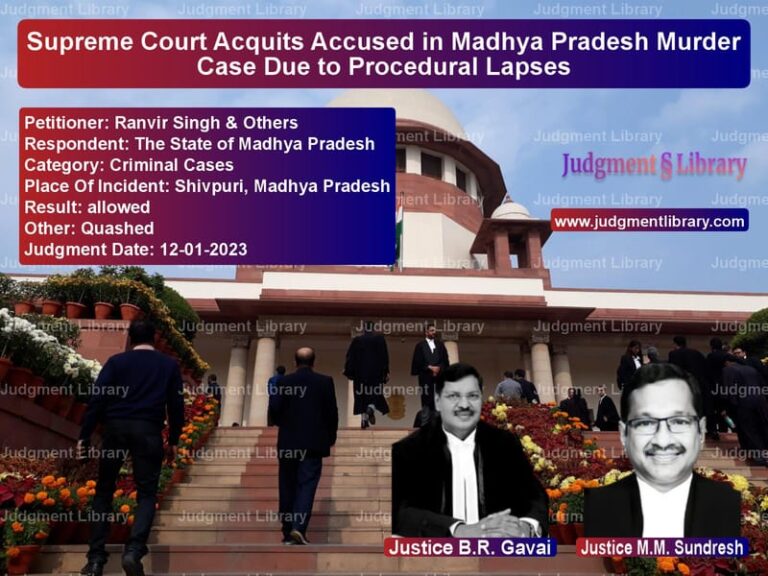Illegal Arms Licensing: Supreme Court Orders Strict Regulations and Accountability
The Supreme Court of India, in the case of Arvind Kumar Sharma vs. Union of India & Ors., addressed a major public interest issue concerning the illegal sale of prohibited bore weapons by Army personnel and the unauthorized issuance of arms licenses. The judgment sheds light on severe lapses in regulatory mechanisms and provides critical directives to prevent future violations of the Arms Act, 1959.
Background of the Case
The case originated from a writ petition filed under Article 32 of the Constitution by advocate Arvind Kumar Sharma, who brought attention to illegal arms trading. The petitioner alleged that Army personnel were selling Non-Service Pattern (NSP) bore weapons, obtained through the Central Ordinance Depot (COD) in Jabalpur, to civilians, including individuals with criminal records. The petition was based on an enquiry report by the Collector of Sriganganagar dated July 3, 2007, which named Army officers involved in such transactions.
The petitioner also highlighted a broader arms licensing scam, where thousands of illegal licenses were issued in states like Jammu & Kashmir, Punjab, Haryana, and Rajasthan. The Central Bureau of Investigation (CBI) had registered multiple cases under sections 465, 468, 471, and 420 read with 120-B of the Indian Penal Code, uncovering massive irregularities in the issuance of arms licenses.
Arguments of the Petitioner
The petitioner made the following key arguments:
- The sale of NSP weapons by Army personnel to civilians, particularly criminals, violated the Arms Act, 1959, and required immediate intervention.
- The state of Rajasthan, especially in Sriganganagar, was issuing arms licenses without proper verification, creating a security risk in a border district.
- The Ministry of Defence should take strict action against Army personnel found guilty of selling weapons illegally.
- A CBI probe should be conducted to uncover the full extent of the illegal arms licensing scandal.
- The Union of India should introduce stricter guidelines to ensure background verification of applicants before issuing arms licenses.
Arguments of the Respondents
The respondents, including the Union of India, the Ministry of Defence, and the Government of Rajasthan, provided the following counterarguments:
- Disciplinary action had already been initiated against Army officers found guilty of selling weapons illegally.
- The licensing authorities in Rajasthan were following the procedures outlined in the Arms Act, 1959, and any lapses were being addressed.
- Several cases had already been filed against those responsible for issuing fraudulent arms licenses.
- The Ministry of Defence had taken necessary steps to prevent future sales of NSP weapons to unauthorized individuals.
- The Home Ministry had issued instructions to ensure thorough verification before granting arms licenses.
Supreme Court’s Judgment
The Supreme Court, in a judgment delivered by Chief Justice T.S. Thakur, Justice A.M. Khanwilkar, and Justice Dr. D.Y. Chandrachud, ruled in favor of the petitioner’s concerns. The key findings of the court were:
- Disciplinary action had been taken against 41 Army officers, with some being relieved of duty and others facing severe reprimands.
- The Ministry of Defence was directed to implement stricter supervision over the sale of NSP weapons.
- The Government of Rajasthan was ordered to conduct a review of all arms licenses issued in the state, particularly in border districts.
- The Home Ministry was instructed to ensure that the licensing process strictly adhered to the Arms Act, 1959.
- Pending criminal cases related to illegal arms licenses were to be expedited.
Judicial Observations
The Supreme Court made several important observations regarding the systemic failures leading to illegal arms sales and licenses:
1. Lax Oversight by the Defence Ministry:
“The appropriate authority has taken into account all the attending circumstances before awarding punishment to the concerned Army Personnel. Had it been a case of all the Army Officials being awarded the same punishment or absolved and exonerated, that may have necessitated further probe by us.”
2. Arms Act Violations Must Be Taken Seriously:
“We reiterate that the mechanism for sale of NSP weapons must be under strict scrutiny and supervision of the Competent Authority in accord with the provisions of the Arms Act and the Rules framed thereunder, including the Defence Services Regulations without any exception.”
3. Importance of Proper Licensing Procedures:
“The licensing authority is obliged to seek a report from the officer in charge of the nearest police station to verify the antecedents of the applicant; and only those who fulfill the prescribed norms are granted licenses.”
Impact of the Judgment
1. Strengthening Arms Licensing Regulations
The ruling ensures that all arms licenses issued in the country will be subject to stricter verification and background checks, reducing the chances of weapons falling into the wrong hands.
2. Increased Oversight on Military Weapon Sales
The Supreme Court’s directives have placed stricter controls on how NSP weapons are allocated to Army personnel, ensuring they cannot be sold illegally.
3. Legal Precedent for Future Cases
The judgment sets a legal precedent that emphasizes accountability in both the military and civilian arms licensing sectors, paving the way for future legal action against similar violations.
4. Improved Coordination Between Government Agencies
The ruling mandates closer cooperation between the Ministry of Defence, the Home Ministry, and state governments to prevent arms-related fraud.
Conclusion
The Supreme Court’s judgment in Arvind Kumar Sharma vs. Union of India & Ors. is a landmark ruling that underscores the need for strict enforcement of arms regulations. By addressing illegal sales of NSP weapons and fraudulent licensing practices, the court has reinforced national security measures and ensured that the Arms Act, 1959, is upheld in both letter and spirit.
The case highlights the importance of vigilance in arms control, ensuring that military personnel, licensing authorities, and the government work together to prevent weapons from reaching criminal elements. The Supreme Court’s intervention serves as a powerful reminder that national security must never be compromised due to administrative lapses or corruption.
Don’t miss out on the full details! Download the complete judgment in PDF format below and gain valuable insights instantly!
Download Judgment: Arvind Kumar Sharma vs Union of India & Ors Supreme Court of India Judgment Dated 16-08-2016-1741878521745.pdf
Direct Downlaod Judgment: Direct downlaod this Judgment
See all petitions in Public Sector Employees
See all petitions in Recruitment Policies
See all petitions in Disciplinary Proceedings
See all petitions in Judgment by T.S. Thakur
See all petitions in Judgment by A M Khanwilkar
See all petitions in Judgment by Dhananjaya Y Chandrachud
See all petitions in dismissed
See all petitions in supreme court of India judgments August 2016
See all petitions in 2016 judgments
See all posts in Service Matters Category
See all allowed petitions in Service Matters Category
See all Dismissed petitions in Service Matters Category
See all partially allowed petitions in Service Matters Category







